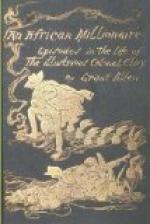However, our prospectors had been canny, they said; though young Mr. Granton was prospecting at the same time, in the self-same ridge, not very far from them, his miners had failed to discover the auriferous quartz; so our men had held their tongues about it, wisely leaving it for Charles to govern himself accordingly.
“Can you dispute the boundary?” I asked.
“Impossible,” Charles answered. “You see, the limit is a meridian of longitude. There’s no getting over that. Can’t pretend to deny it. No buying over the sun! No bribing the instruments! Besides, we drew the line ourselves. We’ve only one way out of it, Sey. Amalgamate! Amalgamate!”
Charles is a marvellous man! The very voice in which he murmured that blessed word “Amalgamate!” was in itself a poem.
“Capital!” I answered. “Say nothing about it, and join forces with Craig-Ellachie.”
Charles closed one eye pensively.
That very same evening came a telegram in cipher from our chief engineer on the territory of the option: “Young Granton has somehow given us the slip and gone home. We suspect he knows all. But we have not divulged the secret to anybody.”
“Seymour,” my brother-in-law said impressively, “there is no time to be lost. I must write this evening to Sir David—I mean to My Lord. Do you happen to know where he is stopping at present?”
“The Morning Post announced two or three days ago that he was at Glen-Ellachie,” I answered.
“Then I’ll ask him to come over and thrash the matter out with me,” my brother-in-law went on. “A very rich reef, they say. I must have my finger in it!”
We adjourned into the study, where Sir Charles drafted, I must admit, a most judicious letter to the rival capitalist. He pointed out that the mineral resources of the country were probably great, but as yet uncertain. That the expense of crushing and milling might be almost prohibitive. That access to fuel was costly, and its conveyance difficult. That water was scarce, and commanded by our section. That two rival companies, if they happened to hit upon ore, might cut one another’s throats by erecting two sets of furnaces or pumping plants, and bringing two separate streams to the spot, where one would answer. In short—to employ the golden word—that amalgamation might prove better in the end than competition; and that he advised, at least, a conference on the subject.
I wrote it out fair for him, and Sir Charles, with the air of a Cromwell, signed it.
“This is important, Sey,” he said. “It had better be registered, for fear of falling into improper hands. Don’t give it to Dobson; let Césarine take it over to Fowlis in the dog-cart.”
It is the drawback of Seldon that we are twelve miles from a railway station, though we look out on one of the loveliest firths in Scotland.
Césarine took it as directed—an invaluable servant, that girl! Meanwhile, we learned from the Morning Post next day that young Mr. Granton had stolen a march upon us. He had arrived from Africa by the same mail with our agent’s letter, and had joined his father at once at Glen-Ellachie.




